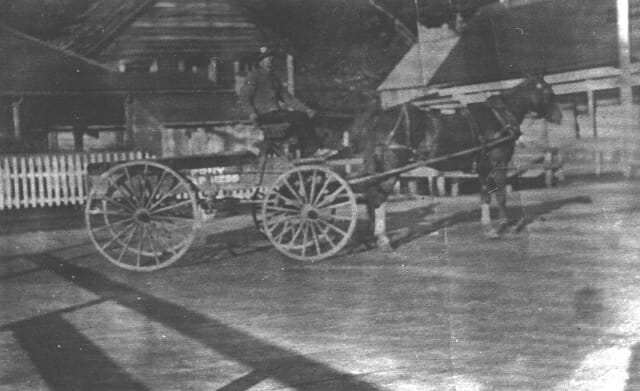Gastineau Channel Memories
Femmer, David Benjamin
Margaret Femmer Cudney
David Femmer was born to Frederick and Henrietta (Heidbrier) Femmer in Americus, Missouri on May 10, 1884. Dissatisfied with farm life, in 1901, David began working his way toward Alaska. From jobs in Arizona, San Francisco and Seattle, he worked for passage to the next stop. After contracting typhoid in Seattle his journey was delayed, but he arrived in Juneau about 1904, after traveling steerage up the Inside Passage.
After David?s arrival in Juneau, he held several jobs, perhaps more than one at a time. He was a laborer for J.P. Jorgensen and Company, worked for the Alaska Transfer Company, was a clerk for Charles Goldstein at Goldstein?s Emporium and then was with the B.M. Behrends Company, possibly delivering coal for the company.
David married Mary Louise Kemmerling of Douglas, Alaska, on September 22, 1906. Louise?s father, Grant Kemmerling, a hard rock miner, had come to Treadwell to work in the gold mines in 1898, and is listed in the February, 1900 U.S. Census as living in the Mexican Mine Lodging House at Treadwell. Louise met David while attending a small mission church in Juneau called the Peniel Mission. In April, 1909, David and Louise purchased a house and lot on West Seventh Street in Juneau overlooking the Indian Village. The Governor?s Mansion was built across the street in 1912. The 1914 telephone directory listed the Femmer?s residence as 239 West Ninth Street. Streets in Juneau were renumbered several times and the Femmer?s home eventually became 239 W. Seventh. They owned the house until the late 1960?s, and it is still there. The Femmers had four children: Muriel in 1907; Rose Etta in 1912; Charles ?Buzz? in 1913; and Mary Margaret in 1926.
About 1907, David started his own transfer business called The Pony Express, using a horse and wagon. He used his wagon to transport glacier ice to saloon owners and transported dynamite up the woodentrestled Basin Road to the mines along Gold Creek.
David served on the 1912-1913 Juneau City Council during the term of Mayor Harry A. Bishop. In the early decades of Juneau government, seven councilmen were elected each April to serve one-year terms. All seven of the 1912-1913 councilmen declined to run again in the 1913 election, coincidentally the first election in which Juneau?s women were permitted to vote.
In 1913 or 1914, David formed a business partnership with Lloyd M. Ritter, his wife?s brother-inlaw, which would last until 1921. The transfer company?s name was changed to Femmer and Ritter. Ritter had come to Juneau from Indiana in 1898. In March 1913, they advertised a stand for Femmer and Ritter?s Express at Burford?s Corner, a cigar store and billiard parlor. The pair had started out in 1913, by buying coal direct from the British Columbia collieries in addition to conducting a large transfer and drayage business.
As the center of mining operations moved across the Gastineau Channel, Femmer and Ritter decided to build a wharf for their growing transfer, coal and storage business. David and Lloyd chose a site on the tidelands about 200 yards west of Main Street, on Willoughby, then a planked street on piling which followed the high tide line past the Indian Village. The land was purchased on June 1, 1915. David went to his friend Judge Wickersham for help getting approval to build the dock on the tidelands. Special Federal permission was needed since the site had historically been a docking place for Indian war canoes. On July 30, 1915, construction began on a 55 by 1,000 foot warehouse on the new dock. The company offered feed, hay, grain, coal, baggage, storage and transfer services.
David and Lloyd Ritter ended their partnership in 1921, and David continued to run the business by himself, calling it Femmer?s Dock and Transfer Company, expanding the business to include gravel sales, freshly killed and dressed chickens, heating oil and at times even real estate. By the late 1920?s, he began to use trucks instead of horses. In 1931, he expanded the wharf space and built a warehouse addition. He also had contracts with the Northland Transportation Line and the Alaska Transportation Company and worked as a boat agent, selling tickets and transporting freight. Prior to 1940, ?airmail? came to Juneau by steamer, but in 1940, airmail began to arrive by plane. Femmer Transfer obtained the airmail and airfreight contracts which the company held until about 1957. Over the years, Femmer sent trucks over to the AJ Gold Mine?s rock dump bringing rocks back to fill in the approach and area surrounding his dock.
In the 1930?s, the U.S. Government had obtained permission from David to build a government float off the end of Femmer?s Dock. Users of the float had to cross Femmer?s Dock in order to reach land. During World War II in 1941 and 1942, David signed Deeds of Easement with the U.S. Government so that the military could easily reach the government float from Femmer?s Dock. On August 15, 1942, the Daily Alaska Empire reported that Femmer?s Dock and property around it had been taken over ?as Government projects,? forcing David to move his business to South Franklin Street in the Connor?s Motor Company building. The Government wanted the site in order to build a Sub Port of Embarkation for submarines and ordered the sale based on ?National Security.? The current site of the subport, which is still in use and mainly occupied by the Coast Guard, was formed by filling the area surrounding Femmer?s Dock.
After losing the dock, Femmer?s Transfer continued to operate although he turned management over to Stanwood P. Whitely and Wayne S. Graham. David?s obituary noted that he had sold the company and later bought it back, driving the trucks himself during the last year of his life.
David died at the wheel of his truck of a heart attack on October 8, 1948, while driving on South Franklin Street. David?s son ?Buzz? Femmer sold the transfer business in 1957, to Reliable Transfer which also bought the airmail and air freight contracts, along with the trucks.
Louise Femmer remained in Alaska until 1969, when she moved to Potomac, Maryland, to live with her daughter Margaret. In 1981, she returned to Juneau and moved into St. Ann?s Nursing Home. She died on August 10, 1983, at the age of 96. Muriel Femmer Graves died May 1, 1990, at Juneau; Rose Etta Femmer died June 15, 1995, at Sitka; and Buzz Femmer died in 1977, at Juneau.
 |
The Pony Express Wagon with an unidentified rider. |
